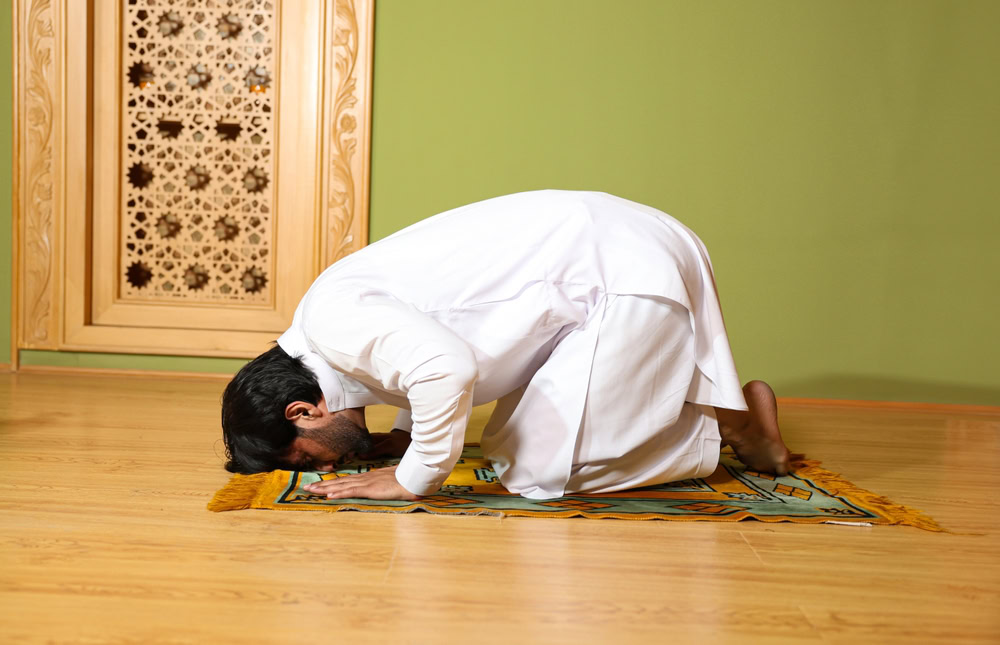How Is the Sajda Sahw Performed, and When Must It Be Done?
Answered by Shaykh Dr. Mohammad Fayez Awad
Question
How is the Sajda Sahw performed, and when must it be done?
Answer
All praise be to Allah (Most High), blessings and peace be upon our master Muhammad, the Messenger of Allah, his Family, his Companions, and those who followed him.
Forgetfulness may come about for a person in his prayer. He may be in doubt of the number of cycles of prayer (rak‘as) he has performed or in some of his actions; thus, the prostration of forgetfulness (sajdat al-sahw) has been legislated to annoy the devil, to make up for any shortcomings, and to please the All Merciful.
Its Ruling
According to Imam Shafi‘i, the Witr prayer is recommended (sunna), not obligatory (wajib). The person is recommended to prostrate twice before the salam; if he were to leave them out, his prayer remains valid.
The Meaning of Forgetfulness in this Context
A mistake occurring during the prayer caused by the worshipper (intentionally or forgetfully), such as deliberately neglecting the first Tashahhud or the Qunut.
Its Evidence
Imam Bukhari narrates from Abu Hurayra (Allah be pleased with him) that he said, “The Messenger of Allah led us in the Dhuhr or the Asr prayer, he then concluded his prayer, Dhu al-Yadayn said to him: ‘The prayer, O Messenger of Allah, has it shortened?’
The Prophet (Allah bless him and give him peace) asked, ‘Is it true what he is saying?’
They replied, ‘Yes.’
Allah’s Messenger then prayed another two rak‘as and performed two prostrations.”
Imam Muslim narrated on the authority of Abu Sa‘id al-Khudri (Allah be pleased with him), who said that the Messenger of Allah (Allah bless him and give him peace) said, “If doubt comes to any of you in your prayer, and you are unsure as to how much you have prayed, whether it was three rak‘as or four, he should cast aside the doubt and base his prayer on what he is certain of. He should prostrate twice before giving the salaam, and if he had prayed five rak‘as, then his prayer shall intercede for him. If he prayed four rak‘as, the prostrations would annoy the devil (targhim). [Muslim]
Imam Nawawi mentioned in his commentary on Sahih Muslim that the Messenger of Allah (Allah bless him and give him peace) said that the two prostrations annoy the devil – meaning that they enrage him and cause him to be humiliated. The word targhim (annoy) comes from ‘al-ragham’, which means soil. This word appears in the dua “arghama Allahu anfuhu,” which means “may Allah humiliate him.” The meaning is that the devil confused his prayer, so Allah (Most High) has made way for the worshipper to rectify his prayer, compensate for the confusion the devil caused, and repel him from his purpose. Thus, the worshipper completes his prayer and adheres to the command of Allah, which the devil disobeyed by his refusal to prostrate. And Allah knows best. [Nawawi, Al-Minhaj]
[Shaykh] Dr. Muhammad Fayez Awad
Shaykh Dr. Muhammad Fayez Awad, born in Damascus, Syria, in 1965, pursued his Islamic studies in the mosques and institutes of Damascus. A graduate of the Islamic University of Medina in 1985, he holds a Ph.D. in Islamic Studies from Bahauddin Zakariya University in Pakistan.
He has extensive experience developing curricula and enhancing the teaching of various academic courses, including conducting intensive courses. Shaykh Awad has taught Fiqh, Usul al-Fiqh, Quranic sciences, the history of legislation, inheritance laws, and more at several institutes and universities such as Al-Furqan Institute for Islamic Sciences and Majma‘ al-Fath al-Islami in Damascus.
He is a lecturer at the Sultan Muhammad al-Fatih Waqf University in Istanbul, teaching various Arabic and Islamic subjects, and teaches at numerous Islamic institutes in Istanbul. Shaykh Awad is a member of the Association of Syrian Scholars, a founding member of the Zayd bin Thabit Foundation, a member of the Syrian Scholars Association, and a member of the Academic Council at the Iman Center for Teaching the Sunna and Quran.
Among his teachers from whom he received Ijazat are his father, Shaykh Muhammad Muhiyiddin Awad, Shaykh Muhiyiddin al-Kurdi, Shaykh Muhammad Karim Rajih, Shaykh Usama al-Rifai, Shaykh Ayman Suwaid, Shaykh Ahmad al-Qalash, Shaykh Muhammad Awwama, and Shaykh Mamduh Junayd.
